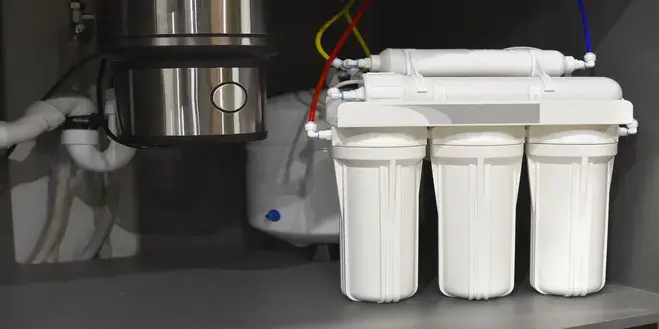
The Many Benefits of Clean Water
As a homeowner, there are many benefits to ensuring your water is clean, soft, and safe for drinking. Fortunately, most American residents receive city-sanitized water and don’t have to worry too much about microorganisms in their tap water. However, water quality significantly varies from city to city. Identifying water quality can help you decide if you need to install a water softener or purifier or take even more drastic measures. At Mr. Rooter Plumbing of Virginia Beach, we specialize in checking water quality and offering elite plumbing solutions and installation services.
Enjoying everyday access to safe, clean water daily usage benefits much more than your health and well-being. Clean water will be gentler on your piping, appliances, faucets, dishware, clothes, and fixtures. On the other hand, poor water will negatively affect your plumbing – accelerating corrosion, rust, and mineral buildup. Many factors, such as water runoff and mineral sedimentation, result from natural phenomena. Other factors, such as letting detergents, grease, and chemical cleaners into your plumbing system, are caused by humans. Today, we will discuss the causes, consequences, and solutions for poor water quality – offering recommendations for protecting your home, office, family, and friends.
Plumbing System Fixtures
The pipes, faucets, and appliances in your plumbing system can also harm water quality. Old lead plumbing can leech chemicals into the water supply, causing contamination. Faucet aerators can also accumulate sediment or trap mold over time. It is essential to clean such fixtures regularly. Lastly, failure to drain, clean, and remove mineral sediment from your water heater can decrease water quality and pressure over time.
Poor Infrastructure & Sedimentation
Areas with high water usage and old filtration technology often rely on greywater treatment systems. Municipalities sometimes set water restrictions and raise costs if the water system becomes too stressed. Another water supply issue involves groundwater scarcity: Concentrations of natural and manmade contaminants will drastically rise when the local groundwater table becomes depleted.
Sedimentation refers to earthy mineral deposits (iron, calcium, etc.) that often concentrate at the bottom of water supplies, tanks, and fixtures. It can cling to pipes, faucets, appliances, and fixtures – steadily accumulating within the plumbing system over time. Too much sediment can cause rust, corrosion, and clogs – obstructing water flow and destroying the sheen of metals, porcelain, and other materials. Sediment residue is visually unappealing (crusty, filmy, and whitish-grey) and physically damaging.
Ph Balance, Salinity, & Acid Sulfate
The pH balance refers to the level of alkalinity or acidity in your water. Ideally, distilled water should have a neutral pH reading. However, tap water’s pH levels can vary due to several factors, and extreme acidity or alkalinity can harmfully impact baking, water flavor, and nutritional effects.
Another common ingredient in water is salt. Salinity levels can become dangerously high in regions with improper irrigation, low vegetation, and mismanaged land. In such circumstances, desalination filters may prove beneficial.
Finally, acid sulfates can naturally leak into water supplies via soil. When these chemical compounds (also known as metal sulfides) interact with air, they can release heavy metals and acids, polluting wetlands/waterways, reducing dissolved oxygen, and altering pH levels.
Organic & Inorganic Pollutants
Homeowners can negatively affect their own plumbing systems. Flushing oils, grease, fats, pesticides, coffee grounds, detergents, prescription drugs, and other chemicals down indoor drains can dramatically taint the local water supply. Another issue results from drainage, sewage, and septic tank grates becoming clogged with foliage, grass, litter, and other debris. By disposing of chemicals, pesticides, fertilizers, and other contaminants properly, you can help keep your water clean.
Bacteria and microorganisms also threaten to hamper water quality. Foul-smelling mold spores can spread among stagnant waters and moist, confined spaces. Reach out today to discuss filters and water treatment systems to reduce health risks and remove pollutants effectively.
Maintaining Water Quality
Numerous appliances and products on the market will help you address and rectify issues negatively affecting your water quality. From filtration equipment that uses reverse osmosis and UV-light purification methods to remove pollutants, investing in the right equipment will help reduce water quality issues. Maintaining water quality can help improve the taste of drinking water, eliminate foul odors, and extend the lifespan of your plumbing system, fixtures, and appliances.
Smart Filtration Methods
At Mr. Rooter Plumbing of Virginia Beach, we’ve witnessed firsthand the upsides of clean water – prolonging the lifespan and sparkly appearance of plumbing fixtures, appliances, piping, and hardware. If your water quality is not up to par, we highly recommend deploying a filtration method to improve its quality sooner than later.
The good news is that there are countless products and multiple strategies we can apply to increase your water quality. Our professional plumbers can install a water filter and boost your water’s safety, cleanliness, taste, smell, and softness anytime!
The two primary residential and commercial filtration methods include:
- Point-of-entry filtration – These systems filter and purify water at the source/water line before it enters your home. Point-of-entry filtration methods include water softeners (to mitigate minerals) and aerators (to purify the water with jets). They require more extensive installation processes but deliver more comprehensive protection.
- Point-of-use filtration – These systems (including distillers, UV-light purifiers, and reverse osmosis add-ons) purify water by removing contaminants directly before they reach the faucet or showerhead. These filtration options work well and can be cost-effective, but they only provide localized water purification and softening.
Whatever method you choose to remove pollutants, we will be there to help you every step of the way. Our team can help you choose the right equipment for your situation and water quality issues, streamline the installation process, and protect your plumbing system – all for an affordable price.
Want more information? Call us for a complimentary consultation today!

